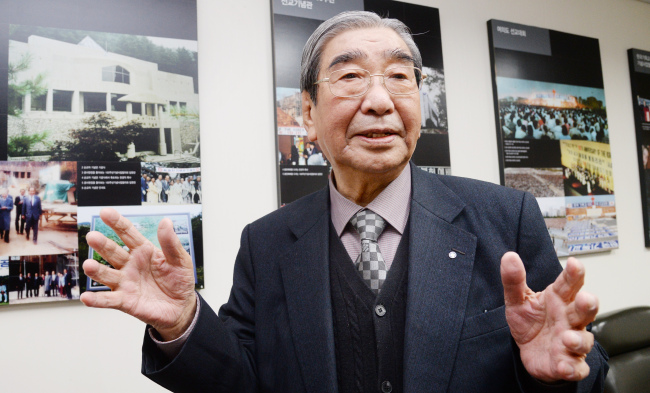Very few people manage to do it. The richer they are, the more difficult it is, they say.
But more people are vowing to leave no inheritance for their children and donate everything to society when they die, carrying out the concept of “noblesse oblige” in Korea, where inheriting wealth is still regarded as a natural way of showing one’s love and passing down tradition to the next generation.
“It is pretty tough at the beginning but once you understand that everything you have in fact came from society, it is easy,” said Kim Gyurng-rae, who leads a movement to leave no inheritance to children, in an interview with The Korea Herald on Tuesday.
 |
Kim Gyurng-rae, head of a movement against inherited wealth, poses for The Korea Herald at the Foundation for the 100th Anniversary of the Korean Church office in Seoul on Tuesday. (Park Hyun-koo/The Korea Herald) |
Kim and his friends launched the campaign in 1984. It started out with 23 people who agreed that the essence of Christianity was living a poor but honest life. After 30 years, the movement has more than 1,250 members.
About 80 percent of them are older than 60, which means that the majority of those making the pledges have a strong will to execute their vows rather than just talk about them hypothetically. “About 80 people have passed away after making their vows and I have witnessed their promises being kept by the surviving family members,” Kim said.
Though the movement does not have a proper organizational structure for promotional or business activities, it has steadily gained attention as a growing number of people have begun to understand that they have accumulated wealth thanks to help from society, from other people, Kim said.
“Let’s take Samsung and Hyundai as examples. The reason why their founders became superrich was not only because they were smart and hardworking but also because they were able to make use of infrastructure that other people had created. The founders were educated at schools, used the roads that the government built, were taught by teachers who studied at the schools. ... And most of all, they have customers who buy their products,” he said.
“It shows that people throughout the world are all interdependent and our wealth and other things that we have are all dependent on one another. Therefore, it is better to share with all rather than just with the family,” he said.
The 86-year-old noted that leaving nothing to children also nurtures their sense of independence. “Children know that they have no one to rely on. So they become more diligent and are eager to make a living, take on their own career. It is a win-win situation,” said Kim, who has eight children.
All of his offspring have successful careers. They include a medical doctor, a high-ranking U.S. Navy officer, three internationally acclaimed musicians, a noted artist and a scholar.
He also said that a professor who joined his movement and decided to donate all his property to charity was met by an unexpected response from his children. “His kids told him that for the first time they had come to respect and admire their father!” Kim said.
“I would like to note that bequeathing property to children can just ignite fraternal disputes in many cases. Share it with people in need,” he added.
Three policies of Kim’s ‘no inheritance’ movement
● Always carry your will: In his jacket Kim keeps a notebook in which he has written a will designating the use of his possessions after death.
The will details his bank account information, the amount of his savings and where to send them, and what to do with his belongings. It also contains notes for his children about what to do if he dies a sudden death from a car accident, for example.
The will is rewritten every year in order to reflect the latest information about one’s wealth and to renew the resolution to carry on the “no inheritance policy.”
● Donate on a regular basis when alive: Don’t wait until you die to distribute your wealth, Kim says. Try to donate even a small amount regularly ― weekly or monthly.
“Try to use the money when you have total control over it. It will remind your family of your willingness to share the money with society instead of them,” he said.
● Recommend for your friends to join the movement: “Since it involves money and family, this is not something that you should oblige others to do or promote with a sense of superiority. It is a matter of choice and requires a deep sense of understanding from your loved ones. It should be more of a recommendation than a request,” Kim said.
By Bae Ji-sook (
baejisook@heraldcorp.com)





![[Exclusive] Hyundai Mobis eyes closer ties with BYD](http://res.heraldm.com/phpwas/restmb_idxmake.php?idx=644&simg=/content/image/2024/11/25/20241125050044_0.jpg)
![[Herald Review] 'Gangnam B-Side' combines social realism with masterful suspense, performance](http://res.heraldm.com/phpwas/restmb_idxmake.php?idx=644&simg=/content/image/2024/11/25/20241125050072_0.jpg)

